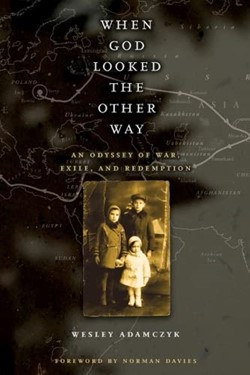Polish Deportations to Kazakhstan 1939-41

When God Looked the Other Way: An Odyssey of War, Exile, and Redemption
Wesley Adamczyk
2006
ISBN 0226004449
Chicago, IL: University of Chicago Press
98 Books about Poland | Polish War Graves in Britain
The Adamcazyk family are awakened in the middle of the night by heavy pounding on the door. It is the NKVD, Soviet secret police, demanding that they pack their things and get ready to leave their home in Sarny, Poland.
One hour later Anna Adamczyk and her children Jurek (17), Zosia (13) and Wiesiu (7) are loaded into an army truck and driven away. They are held at a prison for several weeks before being placed into overcrowded cattle trucks on a train heading east.
Their journey, in the spring of 1940, lasts three weeks, 1900 miles, and takes them through Russia, beyond the Ural Mountains, to Soviet Kazakhstan. They arrive in the Russian steppes, vast tracks of flat grasslands with no trees. A land baked by the sun in summer and buried under snow in winter. They are given a tiny space in a mud hut, already occupied by two Kazakh families, and told - this is where you will live.
Katyn - The Murder of Polish Officers
After Nazi Germany invaded Poland in September 1939 Jan Adamczyk, Anna's husband, a Captain in the Polish army, left his family to join his regiment. On 17 September Poland was also invaded from the east by Soviet Russia. Jan Adamczyk was captured by the Soviets and held in a prison camp at Starobelsk. In the spring of 1940, on Stalin's orders, he and his fellow Polish officers were murdered by the NKVD at Katyn. For two years the Adamczyk family struggled to survive in Kazakhstan unaware of the fate which had befallen Jan Adamczyk.
Escape from the Soviet Union
On 22 June 1941 Nazi Germany attacked the Soviet Union. Food shortages in the Soviet Union became worse. In October 1941 the NKVD allowed Jurek to leave for Totskoye so that he could rejoin the Polish Army being formed under the command of General Wladyslaw Anders. Stalin also agreed with the British that thousands of Polish civilian relatives would be allowed to leave for the Middle East.
Anna Adamczyk constantly asked the NKVD for the necessary papers that would allow them to leave the Soviet Union for Persia. Her fear was that if they did not leave quickly then they might never be allowed to get out of the Soviet Union. The NKVD however never gave them to her so she devised an escape plan of her own. She knew that travel routes were likely to be chaotic with all the Polish refugees trying to reach the Polish army camps. That chaos would be their opportunity.
Journey to Freedom
In the spring of 1942 they walked for a day to the nearest train station, bribed the ticket seller for tickets and set off by train towards the Caspian sea. The trains were so overcrowded that they were never questioned by the NKVD. They travelled through Kazakhstan and Uzbekistan and after three weeks and 2500 miles arrived at a Polish transit camp at Krasnovodsk in Soviet Turkmenistan on the Caspian Sea.
At Krasnovodsk they were reunited with Jurek who was in a Soviet field hospital being treated for malnutrition and exhaustion. They left the Soviet Union on a Soviet freighter bound for Persia. Two days later they arrived in Pahlevi. Disease among the malnourished and exhausted Polish refugees was rife - dysentery, typhus and typhoid flourished. Anna Adamczyk became ill and died on 18 October 1942. She was 45.
In April 1943 Zosia and Wiesiu had a surprise visitor at their Polish camp. Their American cousin, a US Army nurse, on leave from an Army hospital in Ahavz had tracked them down. She helped them arrange passage on a ship to Mexico. However, Wiesiu became ill and they could not go. Eventually they were able to leave Persia for Lebanon and after that to join Jurek in England. In November 1949 Wiesiu set sail for America to join his aunt's family in Chicago. Finally after ten years of wandering and hardship he was once again back in a Polish home.
- Dark Side of the Moon (Polish Deportations) - Zoe Zajdlerowa
- Crater's Edge: A Polish Family's Epic Journey Through Wartime Russia - Michal Giedroyc
- The Silver Madonna - Eugenia Wasilewska (Polish Deportation to Kazakhstan)
- Janek Leja - A Polish Survivor of Siberian Labour Camps
- Paying Guest in Siberia - Maria Hadow (Polish Deportations to Kazakhstan 1940)
- No Place to Call Home - A Polish Survivor of the Soviet Gulag (Kolyma, Siberia) - S Kowalski
- Polish Deportations to Kazakhstan 1940 (Unsettled Account - Eugenia Huntingdon)
- Shallow Graves in Siberia - Michael Krupa (Polish Deportations)
- A Forgotten Odyssey - The Untold Story of 1,700,000 Poles Deported to Siberia in 1940
- The Ice Road - Stefan Waydenfeld (Polish Deportations, Siberia)